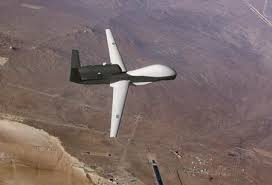
(Credit: epakistan.com)
ISLAMABAD/MIRANSHAH June 12 – U.S. drones fired missiles at Taliban hideouts in Pakistan killing at least 10 militants in response to a deadly attack on Karachi airport, officials said on Thursday, in the first such raids by unmanned CIA aircraft in six months.
Two top government officials said Islamabad had given the Americans “express approval” for the strikes – the first time Pakistan has admitted to such cooperation.
Underlining Pakistan’s alarm over the brazen Taliban attack on the airport, just weeks after peace talks with the Islamist militants stalled, the officials told Reuters a “joint Pakistan-U.S. operation” had been ordered to hit the insurgents.
Another official said Pakistan had asked the United States for help after the attack on the country’s busiest airport on Sunday, and would be intensifying air strikes on militant hideouts in coming days.
Pakistan publicly opposes U.S. drone strikes, saying they kill too many civilians and violate its sovereignty, although in private officials have admitted the government supports them.
“The attacks were launched with the express approval of the Pakistan government and army,” said a top government official, requesting not to be named as he was not authorised to discuss the issue with the media.
“It is now policy that the Americans will not use drones without permission from the security establishment here. There will be complete coordination and Pakistan will be in the loop.
We understand that drones will be an important part of our fight against the Taliban now,” the official added.
The strikes were the first in the nuclear-armed South Asian nation since an attack in December last year in which three suspected militants were killed. The CIA conducts covert drone operations against terrorism suspects.
Speculation has been rising that Pakistan is preparing for a full-scale military operation in North Waziristan, a scenario Prime Minister Nawaz Sharif has resisted for months in favour of a negotiated end to the insurgency.
But talks with the Taliban have collapsed many times since Sharif announced his plan in February and set up a committee of negotiators, mainly over Taliban demands that the government withdraw all troops from tribal areas and impose Sharia law.
AFGHANISTAN CONNECTION
Pakistan military sources said six militants including four Uzbeks were killed in the first strike on Wednesday around five km (three miles) north of Miranshah, the capital of the North Waziristan tribal region where Taliban insurgents are holed up.
The second attack killed four militants in the same area around 2 a.m. on Thursday.
Another source, a senior member of the Afghan Taliban, put the death toll at 16, with 10 killed in the second strike.
A senior member of the Afghan Taliban said all the 10 militants killed in the second strike were affiliated with the feared Haqqani network that regularly launches attacks on Western forces in Afghanistan and which until last month held U.S. soldier Bowe Bergdahl.
“The drones targeted two mini vans which were carrying Taliban fighters associated with the Haqqani network to Afghanistan for an attack,” the Taliban commander said.
The twin drone strikes came after at least 38 people, including 10 insurgents, were killed when militants raided Karachi airport on Sunday night. The Pakistani Taliban are allied with the Afghan militants of the same name and share a similar jihadist ideology.
But they operate as a separate entity, focused entirely on toppling the Pakistani state and establishing strict Islamic rule, whereas the Afghan Taliban are united by their campaign against invading foreign forces.
Sunday’s assault destroyed prospects for peace talks between the Taliban and Sharif’s government, after months of failed attempts to engage the al Qaeda-linked militants in dialogue on how to end years of violence.
The Pakistan government officially condemned the latest strikes and said such attacks “have a negative impact on the government’s efforts to bring peace and stability in Pakistan and the region”. But top officials privately admit the Pakistani government is weighing all options after the Karachi attack.
(Additional reporting by Asim Tanveer in Multan and Jibran Ahmed in Peshawar; Editing by Maria Golovnina and Jeremy Laurence)

